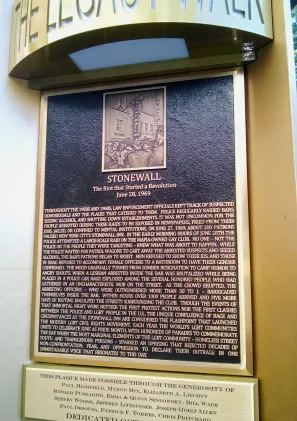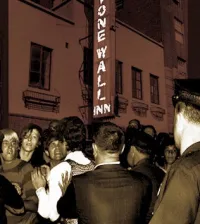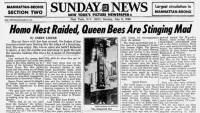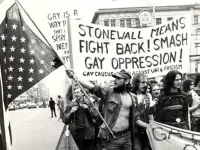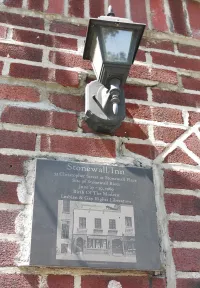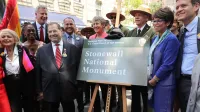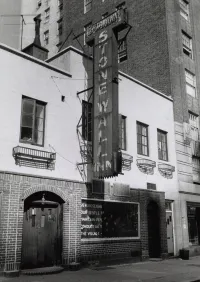-
"In the Civil Rights Movement, we ran from the police, in the peace movement, we ran from the police. That night, the police ran from us, the lowliest of the low. And it was fantastic."
- John O'Brien (Stonewall participant)
Throughout the 1950s and 1960s, law enforcement officials kept track of suspected homosexuals and the places that catered to them. Police regularly raided bars, seizing alcohol, and shutting down establishments. It was not uncommon for the people arrested during these raids to be exposed in newspapers, fired from their jobs, jailed, or confined to mental institutions. On June 27, 1969, about 200 patrons packed New York City’s Stonewall Inn. In the early morning hours of June 28th the police attempted a large-scale raid on the Mafia-owned gay club. No one – not the police or the people they were targeting – knew what was about to happen. While the police waited for patrol wagons to cart away the arrested suspects and seized alcohol, the bar’s patrons began to resist. Men refused to show their IDs, and those in drag refused to accompany female officers to a bathroom to have their gender confirmed. The mood gradually turned from somber resignation to camp humor to angry shouts. When a lesbian arrested inside the bar was brutalized while being placed in a police car, rage exploded among the several hundred people who had gathered in an uncharacteristic mob on the street. As the crowd erupted, the arresting officers – who were outnumbered more than 50 to 1 – barricaded themselves inside the bar. Within hours over 1000 people arrived and five more days of rioting engulfed the streets surrounding the club. Though the events of that immortal night were neither the first protest actions nor the first clashes between the police and LGBT people in the U.S., the unique confluence of rage and circumstances at the Stonewall Inn are considered the flashpoint that launched the modern LGBT Civil Rights Movement. Each year the world’s LGBT communities unite to celebrate June as Pride Month, with hundreds of parades to commemorate the day when the most marginal elements of the LGBT community – homeless street youth and transgender persons – sparked an uprising that rejected decades of non-confrontation, fear, and oppression to declare their outrage in one unmistakable voice that resonates to this day.
Lesson Plan
Demography
Nations Affiliated United States
Era/Epoch Stonewall Era (1969-1974)
Commemorations & Honors
American Library Association's Annual Stonewall Book Awards (1971)
UK LGBT Rights Charity Stonewall Founded (1989)
U.S. Department of the Interior Designated 51 and 53 Christopher Street and the Surrounding Streets as a National Historic Landmark (1999)
Stonewall Inn Named a National Historic Landmark (2000)
Annual Stonewall Awards by the Stonewall Charity (2006)
Addressing Full Equality President Barack Obama Noted the Stonewall Riots During His Second Inaugural Address (2013)
New York City Landmarks Preservation Commission Designated the Stonewall Inn as a City Landmark (2015)
National Park Service Stonewall National Monument Established (2016)
Stonewall 50 WorldPride NYC 2019 Held to Commemorate the 50th Anniversary of the Riots (2019)
Stonewall Riots Square Named in Paris France (2019)
Resources
